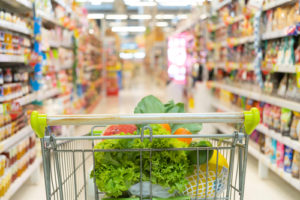
There are two directions that we could take Innovation today. First, we could examine last week’s statistics from the US labour market in detail and over several paragraphs, and conclude that actually no one understands it. From there, we could go on to say that also no one has any idea whether or not the Federal Reserve will increase US interest rates next week, or indeed whether it matters whether they do or they don’t. Alternatively, we could discuss something interesting.
It will probably be of little surprise if I said that I am not a great fan of going around the supermarket. I am therefore probably starting from a position of bias, but Tesco has lost the plot. Or at least the branch at Launceston has, and I assume that the experience is national. The problem is this thing called ‘click and collect’. And very popular it is too. The trouble is that it is now all but impossible to move in the shop for the number of staff trolleys. As fast as the shelf-packers pack the shelves, so the ‘click and collect’ wombles take the stuff off. It is utterly bizarre: Tesco is paying its staff to put things on shelves and to simultaneously remove them. I would then assume that the people paying for this lunacy are you and me, with it being dressed up as ‘inflation’.
This is a minor gripe, however. We have been spoiled by the supermarkets for too long. Why do we need so much choice? A quick glance at Tesco’s website shows that, under ‘Bread and Rolls’, one has 207 items from which to choose. Under the sub-category of ’Seeded Bread’, there are a staggering 22 different items. Why? Is it just me, or is this crackers? On the subject of which, ‘Crackers & Crispbreads’ gives the discerning shopper 43 choices. Presumably, if any of these were to be unavailable, we would take umbrage, post a tweet (or something) saying that Tesco is useless these days, and take our custom to Waitrose or Morrisons.
Which is the egg and which the chicken? Were we all tight-fisted fusspots all along, or did the supermarkets make us this by fighting over each other to give us an ever-wider range of ever-cheaper stuff that we don’t actually need? There are, as they say, arguments on both sides. But when we look at the challenge the UK has with food price inflation, we need to put this into the perspective of its unsustainable starting point. The prices of far too many products were artificially and unsustainably low. 29p for a cauliflower? How does that work? Well, I don’t think it does. Collectively, between ourselves and the supermarkets, we have got food production into a terrible muddle. Much of what we are currently experiencing food-price-wise, has that muddle as its starting point. And we are all, at least partly, to blame for it.
We love to shop. We love a bargain. We love a treat. Last week B&M’s share price rose 17% (ish), to its highest level since last April, after it said that trade is booming and it is intending to open another 30 UK stores. A quick search says that it currently has 665, and my spreadsheet says that would be 695 stores in total. If we simplified this to say that this makes one in each of the largest 695 cities and towns in the UK, then the good folk of Beaconsfield (population 14,650) have a treat coming their way.
The week before, at the other end of the spectrum, the grand duchess of the high street, Marks & Spencer was almost as optimistic. It declared profits of £482m, some £50m higher than expected, and an intention to restart paying dividends for the first time since 2020. It does not feel as if we are in the midst of a consumer crisis. In fact, quite the contrary. Marks’ share price is up 15% in the past month and 53% since the turn of the year.
Finally, it appears there are precious few appreciators of Jessie Ware’s Remember Where You Are. So much for my efforts to be more modern. Today, we go to the other end of the spectrum, with an easy oldie: “I’ve travelled the land, with a guitar in my hand, and an eye ever open for some fun.”
Jim Wood-Smith – Market Commentator and Head of Climate Transition

FPC1079
All charts and data sourced from FactSet
Hawksmoor Investment Management Limited is authorised and regulated by the Financial Conduct Authority (www.fca.org.uk) with its registered office at 2nd Floor Stratus House, Emperor Way, Exeter Business Park, Exeter, Devon EX1 3QS. This document does not constitute an offer or invitation to any person in respect of the securities or funds described, nor should its content be interpreted as investment or tax advice for which you should consult your independent financial adviser and or accountant. The information and opinions it contains have been compiled or arrived at from sources believed to be reliable at the time and are given in good faith, but no representation is made as to their accuracy, completeness or correctness. The editorial content is the personal opinion of Jim Wood-Smith, Market Commentator and Head of Climate Transition. Other opinions expressed in this document, whether in general or both on the performance of individual securities and in a wider economic context, represent the views of Hawksmoor at the time of preparation and may be subject to change. Past performance is not a guide to future performance. The value of an investment and any income from it can fall as well as rise as a result of market and currency fluctuations. You may not get back the amount you originally invested. Currency exchange rates may affect the value of investments.
